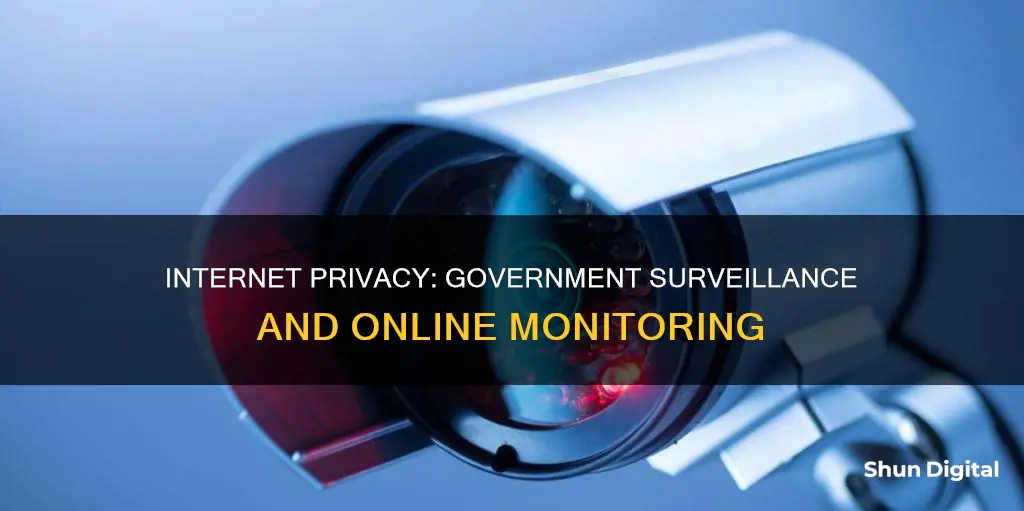
In today's world, internet usage monitoring is a widespread practice, with governments and other agencies employing various methods to track and collect data on citizens' online activities. This practice gained widespread attention in 2013 when Edward Snowden, a former employee of a defence contractor for the National Security Agency (NSA), revealed the extensive surveillance capabilities of US intelligence agencies. Snowden's disclosures brought to light programs such as PRISM, which granted the NSA direct access to the servers of major US internet companies, enabling them to collect user search histories, email content, file transfers, and even live chats.
Since then, concerns about government internet monitoring have intensified, with many civil rights and privacy groups expressing fears of a mass surveillance society that could infringe on individual freedoms. While the justifications for such monitoring often centre around national security and the prevention of criminal activities, critics argue that it may also be used as a tool for repressions, hyper-control, and neglect of human rights.
As internet usage continues to grow, the question of whether the government monitors internet usage remains a pressing issue, sparking debates about the balance between security and individual privacy.
| Characteristics | Values |
|---|---|
| Who monitors internet usage? | Governments, corporations, criminal organizations, or individuals |
| Why is internet usage monitored? | To maintain social control, recognize and monitor threats, prevent and investigate criminal activities |
| How is internet usage monitored? | Surveillance programs, data retention laws, legal requests, information-sharing agreements, surveillance programs, national security requests |
| What information is monitored? | IP addresses, log patterns, URLs and time spent on each site, data amount, metadata, search histories, email content, file transfers, live chats |
| Which countries monitor internet usage? | USA, France, Russia, China, India, Switzerland, Israel, Australia, Canada, New Zealand, UK, Germany |
What You'll Learn

How governments gain access to internet usage data
Governments have various methods to access internet usage data, and their monitoring of online activity is no secret. While Internet Service Providers (ISPs) are often the ones collecting and selling data to governments and big corporations, the latter also has direct and indirect ways to access this information.
Firstly, data-retention laws require ISPs to store user data for a specified period. This data can then be accessed by government agencies through legal requests, such as subpoenas, warrants, and court orders, which are typically issued for criminal investigations, security matters, and other legal proceedings. Intelligence-gathering efforts, authorized by governments, may also involve wiretapping, intercepting electronic communications, and using technology to bypass encryption.
Secondly, information-sharing agreements between ISPs and governments, whether formal or informal, can facilitate data exchange. These agreements may be established for international cooperation in law enforcement or intelligence operations, potentially bypassing domestic restrictions on surveillance.
Thirdly, surveillance programs and national security requests allow governments direct or indirect access to ISPs' networks. Such programs have been revealed in several countries, including the USA, France, Russia, China, India, Switzerland, and Israel, often accompanied by human rights concerns and excessive control.
To justify these programs, governments create a legal framework emphasizing their necessity for combating terrorist threats and improving national security. However, critics argue that this justification may be a smokescreen for power abuse and that there is little evidence that these programs effectively serve their declared purpose.
Finally, governments enter into agreements with ISPs, tech companies, and social media platforms to gather various types of data. This includes:
- IP address tracking to identify device locations and users.
- Deep packet inspection to access data within network packets, used for monitoring, enforcing bandwidth limits, or blocking access to specific websites.
- Browser fingerprinting, which collects information on a user's web browser to create a unique identifier.
- Metadata collection and analysis, including time, date, and communication participants, to identify behavior patterns, interests, and relationships.
- Social media monitoring of public posts, profiles, and trends, as well as undercover agents interacting with users.
- Use of malware and spyware to record sensitive information, such as video, audio, and keystrokes.
The information collected through these methods is then analyzed for keywords, phrases, and patterns of interest to authorities, and it can be shared between different countries. This enables governments to target individuals and groups based on nationality, age, or sex, leading to privacy violations and threats to freedom of speech and basic human rights.
How Closely Does Comporium Monitor User Activity and Bandwidth?
You may want to see also

The legality of government internet monitoring
In many countries, the government plays a significant role in monitoring and regulating internet usage. This is often justified on the grounds of national security, combating terrorism, and preventing criminal activities. For instance, the "Patriot Act" in the United States and the "Investigatory Powers Act" in the United Kingdom were introduced to improve national security in the wake of terrorist threats.
However, the legality of such monitoring programs is often controversial and subject to debate. Critics argue that these programs may infringe on individual privacy and civil liberties. Additionally, there is a lack of solid evidence to support the effectiveness of these programs in achieving their stated goals.
The extent of government monitoring can vary depending on local laws, regulations, and policies. In some countries, Internet Service Providers (ISPs) are required by data-retention laws to store user data for a specified period. This data can then be accessed by government agencies through legal requests, subpoenas, warrants, or court orders. This data can include IP addresses, connection logs, URLs, data transmission amounts, and metadata.
While governments may have legitimate reasons for monitoring internet activity, it is important to strike a balance between security and the protection of civil liberties. The issue of government internet monitoring has led to ongoing discussions and legal reforms to safeguard individual privacy rights.
To protect their online privacy, individuals can take proactive measures such as using secure browsers, Virtual Private Networks (VPNs), and privacy-focused tools. However, it is important to note that the effectiveness of these tools may vary, and staying informed about the latest privacy practices is crucial.
Firefox and User Privacy: Monitoring Usage and Data
You may want to see also

The role of ISPs in government internet monitoring
Internet Service Providers (ISPs) play a crucial role in government internet monitoring. They are companies that provide internet access to consumers and businesses, usually for a fee. While the primary function of ISPs is to facilitate internet connectivity, they also engage in monitoring user activity to varying degrees. The extent of their monitoring activities is often dictated by local laws, regulations, and policies.
ISPs employ several methods to monitor internet usage, including tracking IP addresses, logging connection patterns, recording URLs and time spent on each site, and monitoring data transmission amounts. This data can then be shared with government agencies through legal requests, intelligence-gathering efforts, or information-sharing agreements.
Legal requests can take the form of subpoenas, warrants, and court orders, which are typically issued for criminal investigations, security matters, or other legal proceedings. Information-sharing agreements between ISPs and governments can be formal or informal, facilitating international cooperation in law enforcement or intelligence operations.
Additionally, data-retention laws require ISPs to store user data for a specified period, which can then be accessed by government agencies. This stored data includes browsing history and other personal information.
ISPs also play a role in government surveillance programs and national security requests, providing direct or indirect access to their networks. These programs often raise concerns about privacy violations and human rights abuses.
Furthermore, ISPs can sell user data to big corporations, and this data can also end up in the hands of governments through their involvement in the data trade market.
While the involvement of ISPs in government internet monitoring varies depending on local regulations, their ability to track and collect user data is undeniable. This has led to an ongoing struggle between privacy advocates and surveillance authorities, with individuals seeking to protect their online privacy through the use of VPNs, secure browsers, and other privacy tools.
Cox Internet Monitoring: What You Need to Know
You may want to see also

Government surveillance as a tool for social control
Government surveillance has become an integral part of everyday life, work, and consumption. It is a tool for social control, allowing governments to monitor and influence the behaviour of their citizens. This is achieved through the collection and organization of vast amounts of personal data, which is then used to create detailed profiles of individuals. This data is collected from various sources, including internet activity, social media presence, and consumer behaviour. While governments claim that surveillance is necessary for national security and the prevention of crimes, critics argue that it often serves as a smokescreen for power abuse and infringes on fundamental human rights, including privacy and freedom of speech.
The use of surveillance as a tool for social control has been justified by governments as a means to combat various threats, such as terrorism and criminal activities. For example, the "Patriot Act" in the United States and the "Investigatory Powers Act" in the United Kingdom were introduced following terrorist attacks and aimed to enhance national security through increased surveillance. However, the effectiveness of such programs in achieving their stated goals has been questioned. In many cases, surveillance has been used to target minority communities and social movements, leading to concerns about civil rights and liberties.
Surveillance programs often rely on collaboration between governments and private corporations, such as Internet Service Providers (ISPs) and social media platforms. ISPs monitor users' online activity and share data with government agencies, either through legal requests or intelligence-gathering efforts. Social media platforms, meanwhile, have become a significant source of information for law enforcement and intelligence agencies, who use sophisticated tools to analyze and interpret vast amounts of data. This data can reveal a wealth of personal information, including political and religious views, connections, and health information.
The impact of government surveillance on individuals and society as a whole is significant. It can lead to self-censorship, as people become wary of expressing their views openly online. It can also result in mistaken judgments, where individuals are wrongly implicated in criminal behaviour or their social media activity is misinterpreted. Additionally, surveillance reinforces social inequalities by targeting vulnerable groups, such as minorities and marginalized communities, who are already subjected to discrimination and scrutiny.
In conclusion, government surveillance has become a prevalent tool for social control in the digital age. While it may have some benefits for national security, its potential for abuse and infringement on civil liberties and privacy rights cannot be overlooked. As technology advances and new forms of data collection emerge, it is crucial to strike a balance between security and the protection of fundamental human rights.
Internet Surveillance: Schools' Monitoring of Students' Online Activity
You may want to see also

Public opinion on government internet monitoring
A 2017 survey by Pew found that 70% of US adults think it is at least somewhat likely that their phone calls and emails are being monitored by the government, including 37% who believe this is "very likely". However, only 13% of the public say it is "not at all likely".
A 2022 article by the Brennan Center for Justice highlights the risks of government monitoring of social media for civil rights and civil liberties, particularly for Black, Latino, and Muslim communities that are historically targeted by law enforcement and intelligence efforts. It also notes that there is little evidence that this type of monitoring advances security objectives.
In the UK, a 2022 article in CyberGhostVPN reports that internet surveillance has been a controversial topic since 2001, when the government passed laws allowing greater mass surveillance of its citizens in the wake of the September 11 attacks. While some argue that this surveillance is necessary to protect national interests, others believe it violates privacy rights.
In China, the government is notorious for limiting its citizens' internet freedom. It has outlawed everyday Western platforms like Facebook, Instagram, YouTube, and Twitter. Chinese citizens use Baidu, a heavily state-monitored search engine, and the "Great Firewall of China" keeps them divorced from Western internet activity. China also encourages inter-civilian surveillance and rewards people who report "subversive behaviour".
In Russia, mass surveillance of citizens has been quietly increasing over the years. The Federal Security Service created the System of Operational-Investigatory Measures (SORM) division, which is thought to have been created for the sole purpose of spying on Russian citizens.
In North Korea, while there is no internet, the government monitors all telephone communication. All calls are routed through a central control room, and conversations are recorded and often listened to in real time.
Monitoring WiFi Usage: Track, Analyze, and Optimize Your Network
You may want to see also
Frequently asked questions
Yes, the government does monitor internet usage. In 2013, Edward Snowden revealed the extent to which the US government was able to conduct surveillance on the internet and electronic communications.
The government uses various tools and programs to monitor internet usage, including:
- PRISM, an NSA program that allows direct access to the servers of large US internet companies.
- Carnivore, a tool used by the FBI to monitor the online communications of investigative targets.
- Key logger software, which enables agents to monitor what a person types on their keyboard.
- Packet capture, or "packet sniffing", which involves monitoring data traffic on a network by intercepting and examining small data packets.
No, internet monitoring is not limited to the US. Similar programs have been found in France, Russia, China, India, Switzerland, Israel, and other countries.
While it may not be possible to completely prevent government monitoring, there are some steps you can take to protect your privacy, such as using a Virtual Private Network (VPN) or privacy-focused web browsers and search engines.







